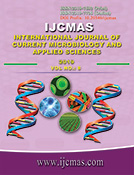


 National Academy of Agricultural Sciences (NAAS)
National Academy of Agricultural Sciences (NAAS)

|
PRINT ISSN : 2319-7692
Online ISSN : 2319-7706 Issues : 12 per year Publisher : Excellent Publishers Email : editorijcmas@gmail.com / submit@ijcmas.com Editor-in-chief: Dr.M.Prakash Index Copernicus ICV 2018: 95.39 NAAS RATING 2020: 5.38 |
The newest waste management technology is bioconversion using fly larvae converting organic waste to insect larval biomass and organic residue. Bioconversion is a practice of recovering resources while simultaneously limiting the amount of organic material affecting landfill behaviour. Several organisms have been used in this treatment process. Several studies have been done using the black soldier fly larvae to degrade organic material. Most of these studies focused on the degradation of cow, chicken or pig manure by Hermetia illucens larvae in cost- and maintenance-intensive systems of developed countries. Undoubtedly, organic waste continues to cause several problems in developing countries, as no valid solution has yet been identified. Development from experimental to full-scale waste treatment facilities, using the larvae of the black soldier fly, offers several advantages. Since such facilities can be developed and operated at low cost (low building and maintenance costs; independent from power supply), they are more adapted to the economic potential of developing countries. This paper presents future areas of research and collected information is expected to open new avenues for a large scale use of insect for management of waste.
 |
 |
 |
 |
 |